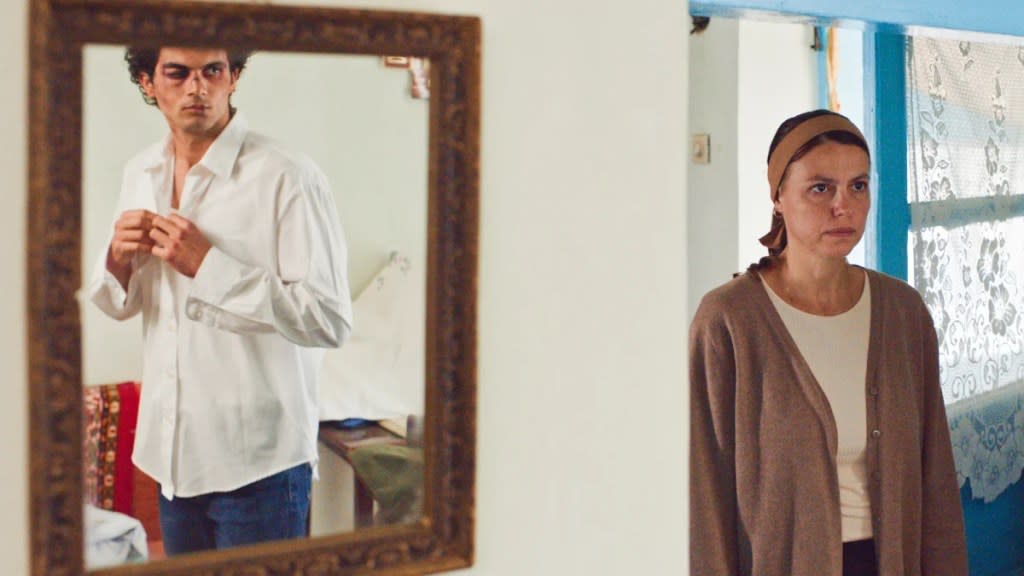‘Three Kilometres to the End of the World’ Review: Emanuel Parvu Examines Reactionary Conservatism From the Inside

“Three Kilometres to the End of the World” opens on the most shocking of images: A sunset, lushly captured in widescreen from far back on beach, silhouetting two lovers with the whole world all to themselves. You might even gasp.
Only once director Emanuel Parvu goes beyond the opening postcard to reveal more of his hand, you can more easily place this Palme d’Or contender within the grand tradition of Romanian cinema at the Cannes Film Festival. And once you get to know this motley bunch, you can more than easily understand why someone might describe them with this pithy summation: “This country is rotten. Just like the people in it.”
If anything, the uncomplicated beauty of that opening shot offers the necessary ballast when set against the ugliness that follows, for actor-turned-director Emanuel Parvu is playing a devious game, dissembling and examining the mechanisms of reactionary conservatism with such focused precision that one can often wonder if this film doesn’t side with the homophobes (it doesn’t; Parvu is simply a dexterous storyteller).
Now, back to that couple canoodling by the beach. One is Adi (Ciprian Chiujdea), a 17-year-old who grew up on this rural alcove on the Danube Delta and still summers there with his salt-of-the-earth clan. The other is a tourist, visiting from the Bucharest and quickly winning over Adi’s heart. To the boy’s misfortune, his paramour is also a man, and that kind of love is frowned upon ‘round these parts — a lesson made clear when Adi returns home later that night battered and bloody, a victim of a hate-crime.
The boy’s father Florian (Bogdan Dumitrache, of Golden Bear winner “Child’s Pose”) is slow on the uptake as to the nature of the assault, though, to his credit, he quickly springs to action to get justice for his son. To the paterfamilias’ discredit, however, he is very much a willing cog of a parochial system that sees such violence as a socially corrective force. This alcove, you see, is not dissimilar to Amity Island in “Jaws,” with the outside thread being the very outside world rather than simple killer shark.
If Adi has our sympathy, Florian holds our focus, with the “Three Kilometres to the End of the World” playing like a seaside companion to Cristian Mungiu’s “Graduation,” once more following a father going against a system in which he is very much complicit. Living in a small-town where everyone is up in everyone else’s business, our avenging father rather quickly finds the assailants, causing his investigation to change focus from “who” to “why” – not looking for motive, mind you, but rather: “With all these pretty girls, why would Adi rather kiss a boy?”
While the dour film lands one of its few laugh as the locals scramble to find an answer, (“Did he get the COVID vaccine,” asks the local priest), Parvu nevertheless explores these dark corners with radiant daylight, shooting from afar and in widescreen so best to situate his characters within a larger community anchored in natural splendor. Indeed, “Three Kilometres to the End of the World” explores this patriarchal system from the inside, taking the father’s perspective, and thus, that of a world that is in many ways very communal and supportive so long as one doesn’t deviate from its norms. It highlights the myriad ways both father and son might benefit from letting bygones be bygones, and doing so challenge our own moral assumptions.
Still the filmmaker recognizes that he’s playing with fire, and through an offscreen assault and on-screen exorcism, he never hides the brutality inherent to an ecosystem that allows others to live in idyll. That makes “Three Kilometres to the End of the World” a tough provocation, if ultimately a rewarding one that leaves the viewer in Adi’s shoes – heartbroken, and happy to get out.
The post ‘Three Kilometres to the End of the World’ Review: Emanuel Parvu Examines Reactionary Conservatism From the Inside appeared first on TheWrap.

